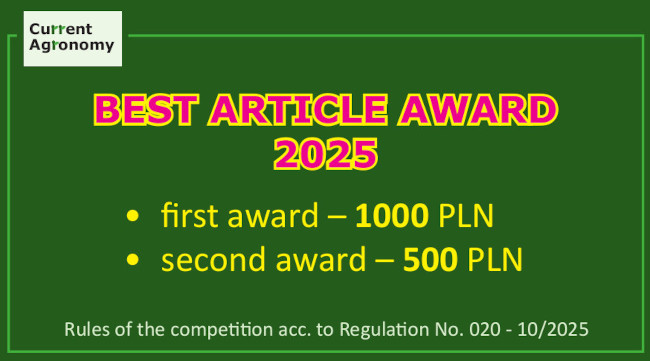Guidelines for Reviewers
Description of the peer-review process
As a rule, all scientific papers in Current Agronomy are reviewed in a double-blind model (the editors do not reveal the names of the authors to the reviewers and the names of the reviewers to the authors). At least two reviewers evaluate each paper from outside the submitting institution. Experts in the field are selected as reviewers, whose qualifications are confirmed by publications and participation in scientific projects. In special circumstances, when an external reviewer cannot be found for a prolonged period, the relevant section editors are appointed as reviewers. In such cases, they do not have access to data that could identify the authors before conducting the review and do not participate in the evaluation of the competition entries if the review covers the article they reviewed.
Reviewers' opinions are intended to support the decision-making process and assist authors in improving their work. The review questionnaire and how to make corrections are described on the journal's website (link to source). Annually, a list of reviewers of published papers from the yearbook is published on the website without tying the names to a particular article.
Principles for reviewers
The consent to conduct a review is tantamount to acceptance of Current Agronomy ethical principles in this regard. The review is required to be impartial, objective, fair, transparent and confidential. Therefore:
- The reviewer is obliged to inform the editor of any potential conflict of interest or knowledge of the author's identity.
- The reviewer is not permitted to condition the assessment of the paper on non-meritorious premises (e.g. lack of citation of the reviewer's work, place of research, the anticipated background of the author).
- The reviewer assesses the content and value of the work. Critical remarks about the author personally, e.g. his/her qualifications or education, are unacceptable.
- The reviewer is expected to screen the paper carefully for correct citation of information references and to inform the editors if plagiarism is suspected.
- Comments and allegations in the review must be formulated clearly and precisely to allow for unambiguous interpretation.
- The reviewer is obliged to submit his/her assessment of the manuscript to the editorial board promptly. If circumstances arise that make this impossible, they are expected to notify the editorial secretary immediately.
- A reviewer is not allowed to use pre-publication data from the assessed work without the author's consent unless this is obtained in writing through the editorial office. Furthermore, the reviewer is not permitted to share the work and the data associated with it with third parties. Both of these stipulations also apply if the reviewer abandons the thesis assessment after receiving it.
- Reviewer must protect the original content of the assessed paper from being made available to third parties prior to publication. Therefore, Artificial Intelligence (AI) tools that use input queries for machine learning (e.g. the free version of ChatGPT) cannot be used, as they do not provide such protection.
In the case of a proven deliberate material breach of ethical principles by a reviewer, for example, misappropriation of data from a peer-reviewed paper, the reviewer is removed from the journal's list of contributors and the reviewer's employing institution is notified of the incident.
Method of peer-review implementation
The OJS electronic or tabular form is available on the journal's website (link to documents) to accomplish the review.
Any negative assessment in the individual points of the review must be carefully justified. The review must end with a clear choice of one of the options:
– acceptance without corrections,
– minor amendments necessary,
– moderate rewriting necessary without re-review,
– major revision and re-review necessary,
– rejection of the work.
How any amendments are made to the text is arbitrary. However, it must allow for an unambiguous interpretation of the comments.
The review may be submitted to the editor via the OJS system or sent by e-mail or post to the address of the editorial secretary.
Processing of complaints and requests
The complaints and requests should be addressed to the Current Agronomy editorial secretary.
Responses are provided within 20 calendar days of the acknowledgement of receipt of the complaint/request.

